Fast-fashion retailer Forever 21 officially closed its doors on May 1st, marking the company’s burial in retail history. The beloved fashion go-to place for fun and affordable finds for millenniums has officially closed all its U.S. locations after filing for Chapter 11 bankruptcy twice, in 2019 and 2025, and being acquired by Authentic Brands Group and mall operations.
After filing for bankruptcy in March 2025, the Forever 21 brand, and operating company F21 OpCo, was approximately in the hole of $1.58 billion in debt. Forever 21 filed for bankruptcy in the U.S. Bankruptcy Court officially on March 16th, due to competition from foreign fast fashion companies like Shien, the Chinese e-commerce retailer. Shein is currently selling their clothes at faster rates at cheaper prices online. Forever 21 was hemorrhaging $120 million.
The company, was the pioneer of fast fashion, popularizing the “going-out” top and their infamous yellow plastic shopping bags. The brand was once of the most successful brands in the 2000s, but has been facing a huge struggle in the last six years, since COVID-19 in 2020, with the huge economic inflation. The brand that targets teens and young women and is inspired by designer styles, at rock-bottom prices, grossed over $4 billion in sales, and employed over 43,000 people in hundreds of stores across the U.S.
In 2005, Forever 21 was purchased by the Gadzooks chain which doubled the number of stores. By 2006, the Forever 21 brand was worth a billion dollars. Forever 21 then launched the Forever 21 Visa Credit Card Program with Bread Financial and Comenity Bank. The credit card gave a $10 bonus and 20% discount reward on approval, and 15% off every purchase after. The Forever 21 credit card program has been discontinued and will officially end on June 6th.
n 2011, according to a consumer survey, around 12% of teenagers listed Forever 21 as their favorite brand. In 2015, Forever 21 was at its peak grossing over $4.4 billion dollars in global sales that year. The brand expanded in other lines like Forever 21 Men’s’ Clothing, and LOVE 21.
The brand expanded internationally with over 200 stores, and 35 of those stores were over 35,000 square feet, and this expansion came at a cost. After filing for bankruptcy in 2019, they cited that the international stores underperformed and lost $10 million in Asia.
After filing for bankruptcy in 2019, which started closing down 30% of its stores, the company started aggressively expanding its brand by operating a store-within-stores with Forever 21 outlets, and collaborations with other brands.
Some of these collab partnerships tried to give the brand a new evolution for the company. Some of their most famous collaborations started in May 2009, when the companyexpanded their demographic of shoppers with Forever 21 Plus, which was a plus size line going up to 4x, which was a decision based on the need for affordable trend-driven plus size clothing at affordable prices. The brand, even started a 2nd plus line called Faith 21 ( or Faith_twenty_one on Instagram) that would debut new online and in-store clothing exclusively every Friday, which was an ultimate fail.
In 2022, the company would collab lines with popular Y2K streetwear brands like FUBU, Baby Phat, and Phat Farm, In 2023, Forever 21 launch collabs with limited-edition collections with Hello Kitty, Coca-Cola, and clothing inspired by the Netflix series, “XO, Kitty”.
In 2024, Forever 21, teamed up with Hip-Hop artist Saweetie for her Forever Naughty, Forever Nice Christmas line, which was the perfect blend of glam and comfort and capturing her “Icy Girl” aesthetic.
Next, the company came out with a 2nd Hello Kitty line for the 50th anniversary of the brand.
In 2024, the brand reached out to other designers like legendary punk designer Betsey Johnson and L.A. Y2K luxury brand Juicy Couture for collaborations. Other brands the company collaborated with are the Forever 21x Wicked collection, inspired by the Ariana Grande and Cynthia Erivo musical film and the Forever 21 Mean Girl 20th Anniversary collection based on the musical adaptation starting Renee Rapp, Lindsey Lohan, and Tina Fey.
Ultimately, on Forever 21’s 40th anniversary, the store was put on the chopping block with its liabilities being ten times bigger than its assets. Forever 21 was originally founded in 1985 in High Land Park, Los Angeles by Korean immigrants, Do Won Chang and his wife, Jin Sook.
The once family-owned store funded its 1st 900 square-foot store with their savings of $11,000. The company made $700,000 in its first year. In 1987, they changed their name from Fashion 21 to Forever 21. Their name was changed because the company added every six months in malls across America. The idea was the fashion in Forever 21 was for anyone who wants to be trendy, fresh, and young in spirit. Jin Sook approved over 400 designs a day for their stores and became one of the largest tenants in American malls. Do Won Chang, and Jin Sook became America’s wealthiest couple with an estimated net worth of $5.9 billion in March 2015. The new goal was for Forever 21 was to become a $8 billion-dollar company by 2017 and open 600 new stores in the next three years.
According to a survey taken in 2019, 60% of online sales were made by millennials, which made Forever 21 sales drops by 20%. In 2020, during the height of the COVID-19 pandemic and the temporary closing of retail stores called retail apocalypse, was one of the factors that lead to Forever 21 starting to downsizing their store locations. During the retail apocalypse, over 15,000 retailers closed down including chain brands like K-Mart, Lord & Taylor, Lohmann’s , Pier 1 Imports, GNC Vitamin Stores, and Bed, Bath & Beyond.
n 2018, H&M and Zara ranked as the top two global apparel and footwear, when Forever 21 ranked number 17, and lost 0.3% share in footwear.
In 2021, one of their investors CEO of Authentic Brands Group, Jamie Salter, said “buying the Forever 21 brand was the biggest mistake”. In an interview in 2023, he stated he brought the company in hopes to save the company. “The company needed to understand what companies like Shien’s doing if they want to compete, because their just faster and better at customer service,” he said.
The increased competition, from online fast-fashion brands like Fashion Nova, Pretty Little Things, ASOS, boohoo, and Zara, and increased inflation lead to Forever 21’sdownfall.
After the store liquation closings, the company should lose more than $180 million.
The last two active stores in New York located at 34th Street and 42nd Street Times Square, are having their closing-out sale with discounted clothing to 70%-80% off and selling store furniture and mannequins as low as $50.
The location at Times Square a two-floor 90,000 square-foot real estate investment, became a financial drain on the company.
When visiting the stores, and trying to speak to employees and managers on their feedback on the store closures and selling of the store fixtures and furniture, a store manager stated “According to the company, no employees were allowed to give a statement.”
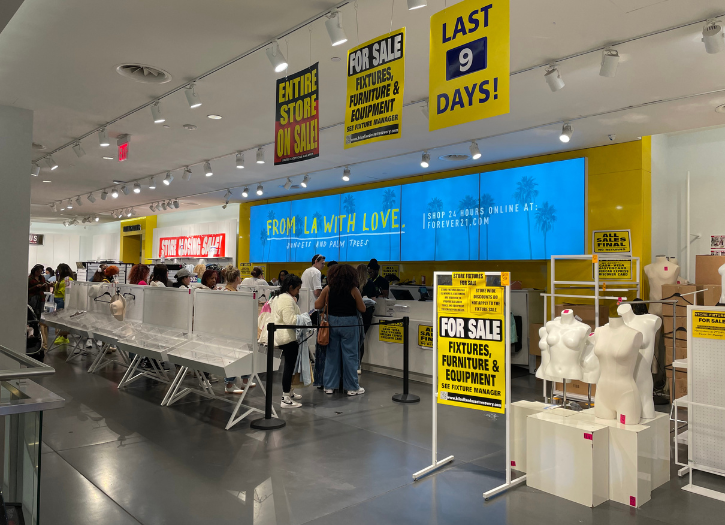
The remaining Forever21 had all sales made online and in-store sales deemed final sale.
The stores fixtures and furniture were on sale and was “first come, first served” like the clothing racks for $100, tables for $25, baskets for $10, and white mannequins for $20 per body.
The massive store at 42nd Times Square were selling boxes of hangers for $20 per box, Hello Kitty products for 80%, and plus-size clothing for up to 60% off. Shoppers grabbed up piles of clothes and lines dragged to the back of the store with shoppers grabbing up the last-minute deals before the final closing date.
Many influencers have taken to social media to express their devastation and on losing Forever 21. Many influencers flooded social media with Forever 21 hauls showing off merchandise they brought. On April 30th, remaining merchandise were marketed down to as low as $2.99 with no tax.
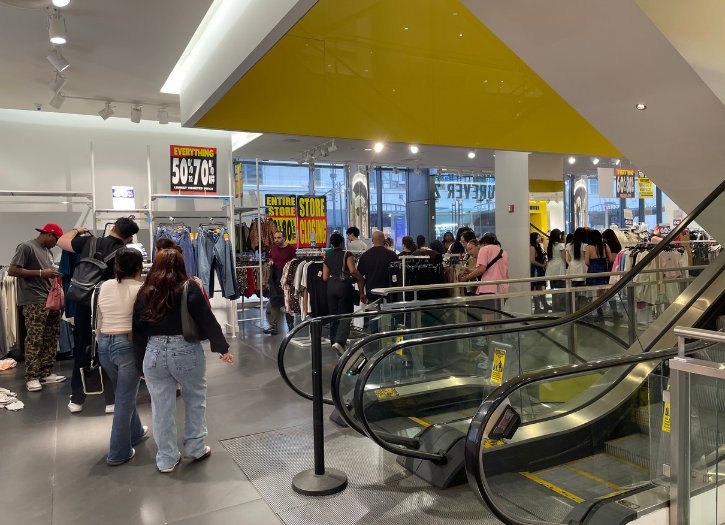
As for their online store, On May 2nd, the company posted a letter called ” A Notice to Our Customers”, explaining “In connection with the filing, we are beginning the process of closing several stores across the U.S. Importantly, however, our stores will remain open for the time being and we will continue to fulfill customer orders placed online. If you have questions regarding the Company’s chapter 11 process, you can visit our case website at www.veritaglobal.net/forever21 Again, we are sincerely grateful for your loyalty and support of Forever 21.”
The Forever 21 website is still active selling with any left-over merchandise, and clothing from brands like Anne Klein, Calvin Klein, BCBG, and Champion at final sale. The company will say goodbye forever to millenniums, and Forever 21 has officially come to an end.
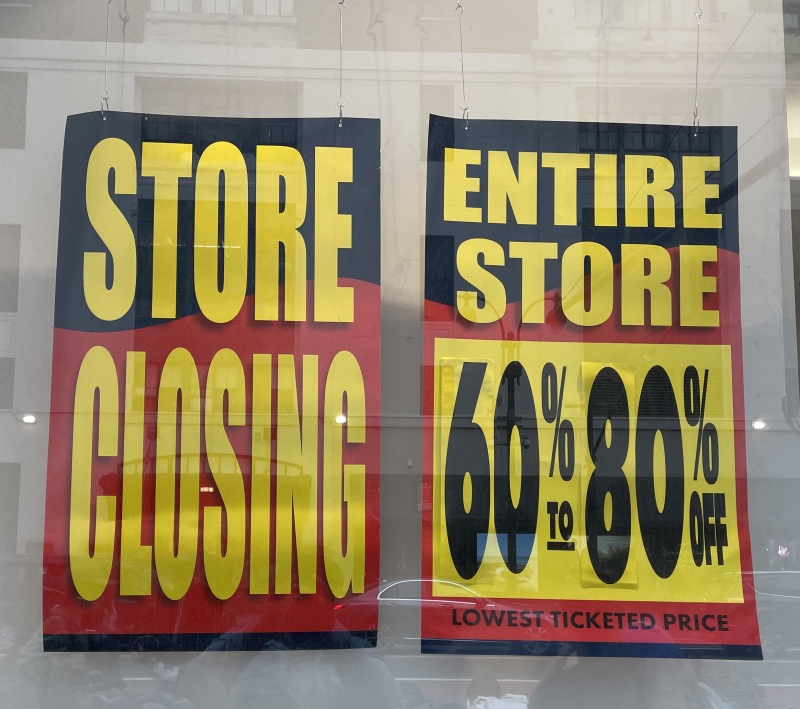
Photo Credit: Sherica Daley

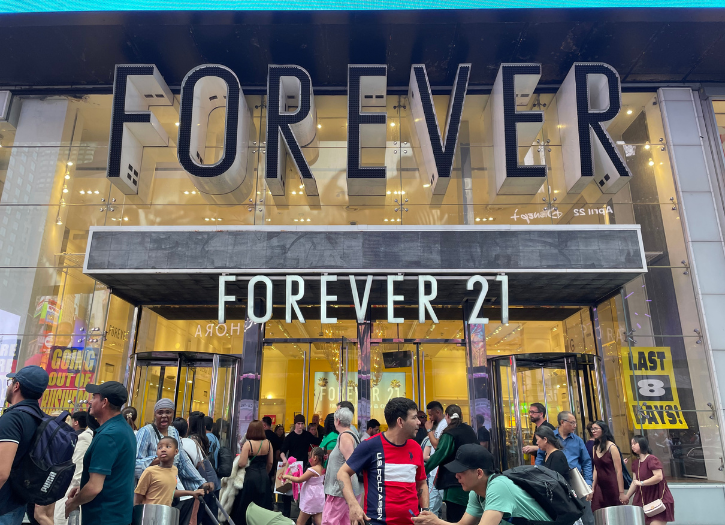




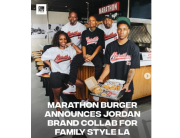
Add Comment
You must be logged in to post a comment.